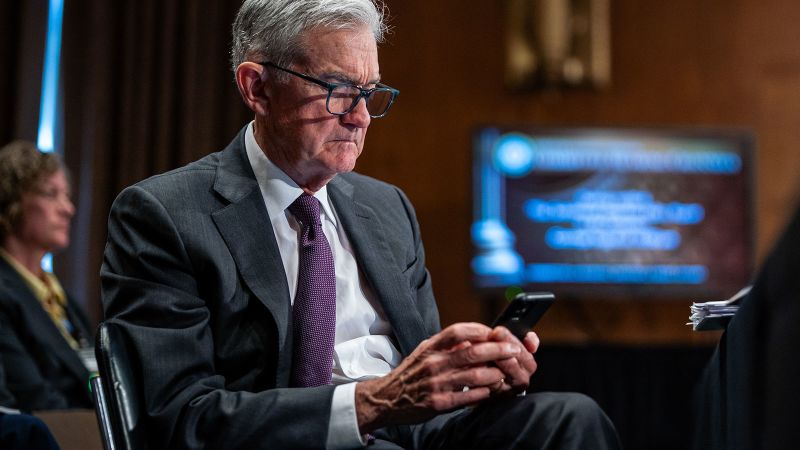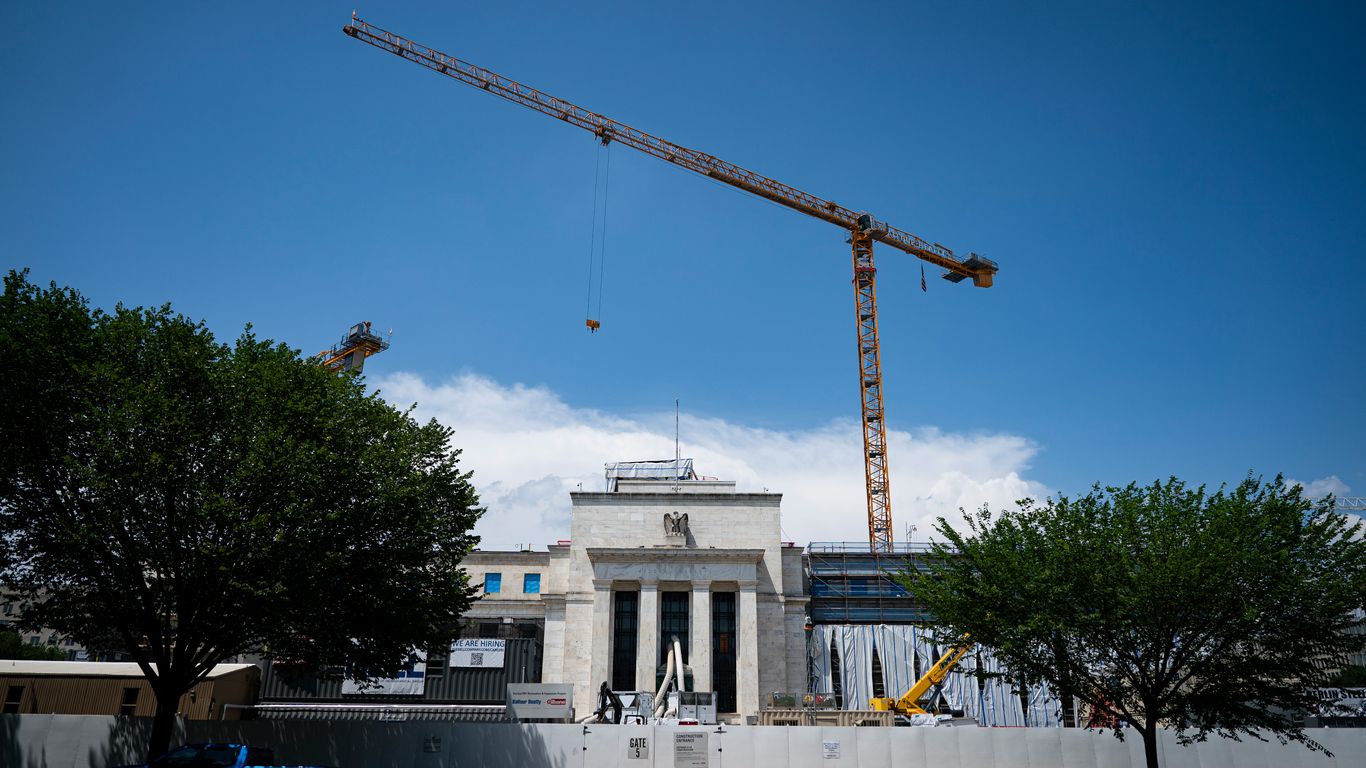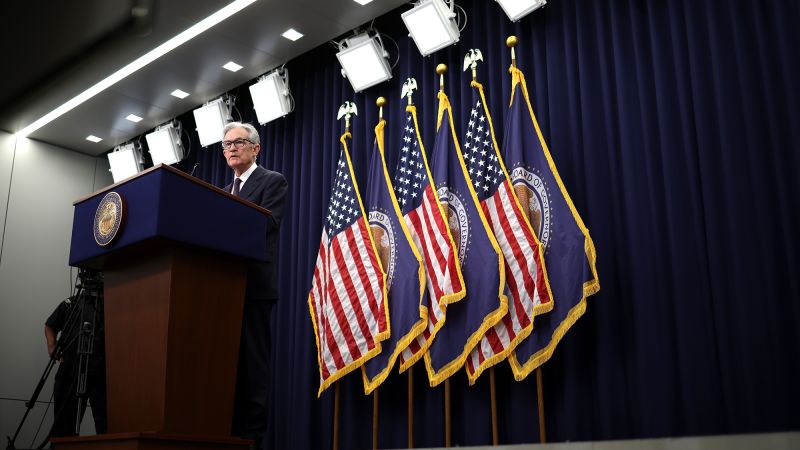Justice Department Launches Probe into Federal Reserve Governor Lisa Cook's Actions

Introduction
The Justice Department has set its sights on Federal Reserve Governor Lisa Cook, signaling a potential investigation into her actions while on the board. In a letter to Federal Reserve Chair Jerome Powell, the department's top official encouraged Powell to remove Cook from her position as the probe gets underway, according to sources from Bloomberg. This move raises questions about Cook's performance and potential misconduct during her time at the Fed.
Possible Misconduct
Cook's time at the Federal Reserve has been marked by controversy, with some questioning her qualifications and actions while on the board. In the past, she has been accused of making political statements, which goes against the Fed's mandate to remain politically neutral. Furthermore, her involvement in the decision-making process for policies, such as interest rates, has been called into question. The Justice Department's probe will likely delve into these issues and more, adding to the already turbulent political landscape at the Fed.
Implications
The Justice Department's letter is a clear indication of the growing tensions between the political and monetary spheres. With the Fed's independence at stake, Powell faces a tough decision in whether to remove Cook from her position or stand by her. The outcome of this investigation will undoubtedly have a significant impact on the Fed's future operations, as well as on the overall stability of the US economy. As the investigation unfolds, the public will be watching closely
About the People Mentioned
Lisa Cook
Lisa DeNell Cook (born 1964) is an American economist and a member of the Federal Reserve Board of Governors, having assumed office in May 2022 and reappointed in September 2023 for a term ending in 2038. She is notable as the first African American woman to serve on the Federal Reserve Board[1][2][6][8]. Cook holds a BA in Physics and Philosophy from Spelman College, where she was the first Marshall Scholar, and earned a second BA in Philosophy, Politics, and Economics from Oxford University. She completed her Ph.D. in Economics at the University of California, Berkeley, specializing in macroeconomics and international economics[2][3][6]. Her academic career includes faculty positions at Harvard University's Kennedy School of Government (1997–2002), where she was deputy director of Africa Research at the Center for International Development, and Michigan State University, where she has been a professor of economics and international relations since 2005 and gained tenure in 2013[1][2][3][6]. She was also a National Fellow at Stanford University's Hoover Institution (2002–2005). Cook has held significant advisory roles, including senior economist on the Obama Administration’s Council of Economic Advisers (2011–2012) and senior advisor on finance and development at the U.S. Treasury Department (2000–2001). She advised the Nigerian government on banking reforms and Rwanda on economic development[1][2][6]. Her research spans international economics, economic growth, innovation, financial markets, and the economic history of African Americans, notably linking racial violence during Jim Crow to suppressed patent activity. She also leads efforts to promote diversity in economics, directing the American Economic Association’s Summer Program for underrepresented minority students and serving on its Executive Committee[1][5][6]. In 2020, Cook contributed to the Biden presidential transition team’s review of financial regulatory agencies. She has also served on the board of directors of the Federal Reserve Bank of Chicago and the Federal Home Loan Bank of Indianapolis[1][5]. Cook is recognized for her scholarship, public service, and advocacy for inclusion in economics, and has been honored as a leading Black economist by Fortune magazine[5].
Jerome Powell
Jerome H. Powell is the Chair of the Board of Governors of the Federal Reserve System, the central bank of the United States, a position he has held since February 2018 following his initial appointment by President Donald Trump and subsequent reappointment by President Joe Biden for a second four-year term in May 2022[2][5]. He also chairs the Federal Open Market Committee, the Fed’s principal monetary policymaking body[2]. Powell’s tenure spans some of the most significant economic challenges in recent U.S. history, including the post-Great Recession recovery and the financial fallout from the COVID-19 pandemic[3][6]. Born on February 4, 1953, in Washington, D.C., Powell holds an AB in politics from Princeton University (1975) and a law degree from Georgetown University (1979), where he was editor-in-chief of the Georgetown Law Journal[2]. His career before the Fed included roles as a lawyer and investment banker in New York City, a partner at The Carlyle Group (1997–2005), and a visiting scholar at the Bipartisan Policy Center focusing on fiscal issues[2][5]. He served as both Assistant Secretary and Under Secretary of the Treasury under President George H.W. Bush, with responsibilities for financial institutions and the Treasury debt market[2][5]. Powell was first nominated to the Federal Reserve Board by President Barack Obama in 2012 and assumed office in May of that year, later being reappointed for a term ending January 31, 2028[2][8]. As Fed Chair, he initially continued the policy of gradually raising interest rates—a process begun under his predecessor, Janet Yellen—to return monetary policy to more normal levels after the 2007–08 financial crisis[3]. This approach drew criticism from President Trump, who publicly opposed further rate hikes, but Powell maintained that such measures were necessary to prevent inflation and ensure long-term stability[3]. Powell’s leadership was again tested during the COVID-19 pandemic, when he led the Fed in slashing interest rates to near zero, launching emergency lending programs, and purchasing corporate debt to stabilize financial markets—actions that significantly expanded the central bank’s role in the economy[3]. Despite political pressures from both Democratic and Republican administrations, Powell has been praised for his steady, data-driven approach to monetary policy[6]. He resides in Chevy Chase, Maryland, with his wife and three children[6]. As of 2025, Powell remains a central figure in U.S. and global economic policy, overseeing the Fed’s efforts to balance inflation control with support for economic growth amid ongoing uncertainties in the financial landscape[2][5].
About the Organizations Mentioned
Justice Department
The United States Department of Justice (DOJ) is the principal federal agency responsible for enforcing federal laws, ensuring public safety, and protecting civil rights. Headquartered in Washington, D.C., the DOJ operates under the leadership of the Attorney General, who serves as a key member of the President’s Cabinet. As of 2025, Pam Bondi holds this position, having taken office in February and quickly shaping the department’s priorities. Established in 1870 during President Ulysses S. Grant’s administration, the DOJ’s roots trace back to the creation of the Attorney General’s office in 1789. Over the years, it has grown into a vast organization with more than 115,000 employees and over 40 component agencies, including the Federal Bureau of Investigation (FBI), Drug Enforcement Administration (DEA), and U.S. Marshals Service. The DOJ also houses specialized divisions for criminal, civil, antitrust, tax, civil rights, and national security matters, and oversees 94 U.S. Attorney offices nationwide. The DOJ’s mission centers on upholding the rule of law, safeguarding national security, and defending civil liberties. In 2025, the department has shifted its enforcement focus, prioritizing areas such as healthcare fraud, customs and tariff evasion, and corporate misconduct, especially involving foreign adversaries and financial gatekeepers. Recent policy changes have emphasized efficiency in investigations and reduced reliance on corporate compliance monitors, reflecting a broader effort to minimize regulatory burdens on businesses. Notably, the DOJ has also been tasked with reviewing past government conduct to address concerns about the “weaponization” of federal agencies, ensuring accountability and restoring public trust. For business and technology leaders, the DOJ’s evolving priorities—particularly in areas like cybersecurity, antitrust, and international trade—have significant implications for compliance, risk management, and corporate governance.
Federal Reserve
## Overview and Mission The Federal Reserve, often called the "Fed," is the central bank of the United States, established by Congress in 1913 to provide the nation with a safer, more flexible, and stable monetary and financial system[1]. Its mission centers on a dual mandate from Congress: to promote maximum employment and maintain price stability, ensuring the dollar retains its value over time[1]. The Fed operates through a unique hybrid structure, combining a national Board of Governors in Washington, D.C., with 12 independent regional Reserve Banks, including institutions like the Cleveland Fed[1]. This decentralized setup allows the Fed to closely monitor economic conditions across diverse regions, industries, and communities, while maintaining independence from short-term political influences[1]. ## Key Functions The Fed’s responsibilities are broad and vital to the U.S. economy. It conducts monetary policy—primarily by influencing interest rates—to achieve its employment and inflation goals[2]. The Fed also supervises and regulates banks to ensure the safety and soundness of the financial system, works to minimize systemic risks, and fosters efficient payment and settlement systems[2]. Additionally, it promotes consumer protection and community development, addressing emerging issues through research, supervision, and enforcement of consumer laws[2]. ## History and Evolution The Federal Reserve is the third central bank in U.S. history, following two failed attempts in the 19th century[1]. Its creation was a response to the financial turbulence of the early 20th century, aiming to prevent crises and stabilize the economy. Over time, the Fed has evolved, adopting more transparent and inclusive policymaking processes. For example, it now conducts regular reviews of its monetary policy framework, engaging with academics, businesses, and the public to refine its strategies and communications[3][5]. ## Recent Developments and Achievements In 2025, the Fed completed its second major review of its monetary policy strategy, tools, and communications, reaffirming its commitment to transparenc
















